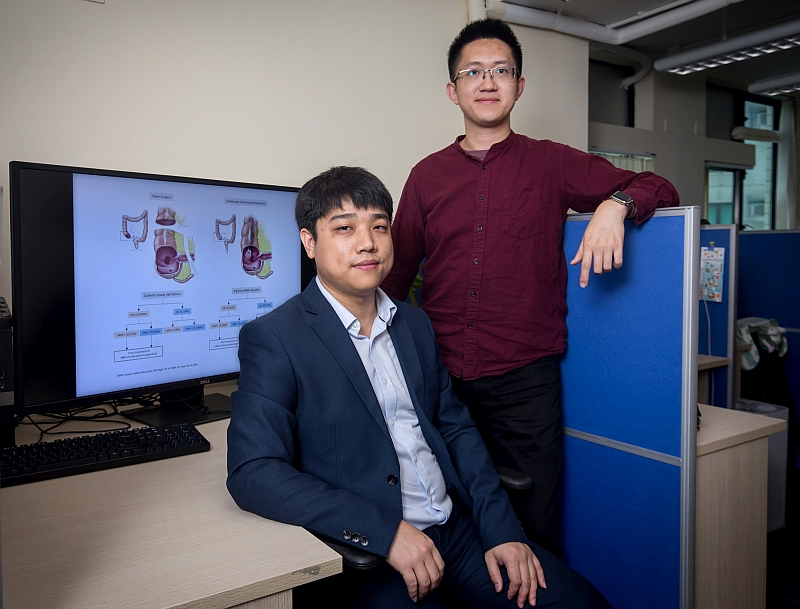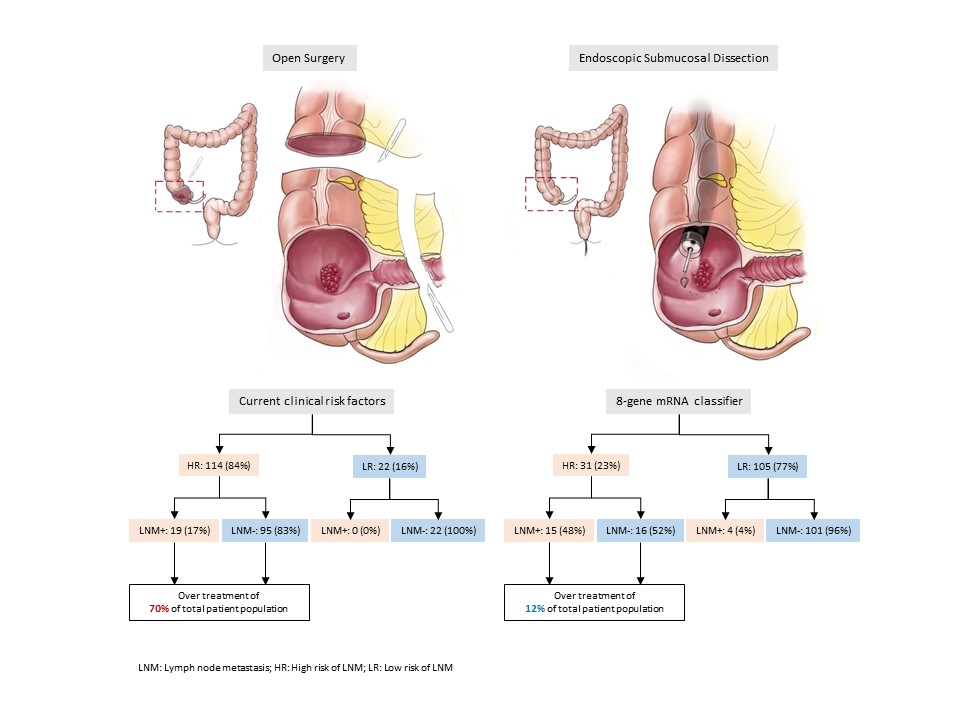A biomarker for categorising colorectal cancer patients

Colorectal cancer (CRC) is one of the leading causes of cancer-related deaths worldwide. While endoscopic submucosal dissection (ESD), a minimally invasive surgical procedure to remove gastrointestinal tumours, is sufficient for treating early-stage CRC patients who are at low risk for developing lymph-node metastasis (LNM), the current risk-stratification criteria based on post-endoscopic pathological examination tend to overestimate the degree of risk. A new biomarker was developed by a joint research team to detect LNM in patients with T1 CRC more accurately.
According to the World Health Organization, about 862,000 people died of colorectal cancer worldwide in 2018, just less than that of the number one killer, lung cancer. In the past few decades, the incidence and mortality rates of the colorectal cancer have increased rapidly in East Asian countries. More precise and effective diagnostics and treatment are needed.
Recent evidence suggests that ESD alone is sufficient for treating T1 CRC patients who are at low risk for developing LNM; while the more extensive radical surgery (RS) is only needed for high-risk patients. Unfortunately, the current risk-stratification criteria based on the post-endoscopic pathological examination tend to overestimate the degree of risk, and inadvertently classify 70-80% of patients with T1 CRC as high-risk. However, post-surgical pathology results suggest that only 8-16% of these patients are truly LNM-positive. This concern highlights the lack of availability for more appropriate biomarkers that can help to detect “genuine high-risk” patients with LNM, which can facilitate the reduction of unnecessary radical surgeries currently being performed in patients with T1 CRC.
Using a genome-wide biomarker discovery approach, Dr Wang Xin, Assistant Professor of Department of Medical Sciences at City University of Hong Kong (CityU), developed a novel 8-gene mRNA classifier for more accurate detection of LNM in patients with T1 CRC, in collaboration with Professor Ajay Goel at Baylor University Medical Center and Dr Tsuyoshi Ozawa at the University of Tokyo. Their findings were recently reported in Gastroenterology.
In their study on a retrospective cohort of 136 T1 CRC patients, current pathological criteria for risk assessments would classify 84% patients into the high-risk category, of whom only 17% were found LNM-positive in post-surgical examination of tissues, meaning 70% of all patients were incorrectly categorized as high-risk. The novel mRNA classifier would only categorize 23% of patients as high-risk, of whom 48% were actually LNM-positive, suggesting that only 12% of all patients were over-treated. The new approach can reduce unnecessary treatment T1 CRC patients by nearly 60%.
Furthermore, the mRNA classifier was validated in multiple independent patient cohorts, as well as matched surgical and biopsy specimens, which further demonstrated the clinical potential of this novel risk stratification approach.

According to Dr Wang, he and his team are planning further studies to evaluate and validate the performance of the biomarker before their translation into clinical practice. “We hope one day we can develop more precise diagnostic tools for colorectal cancer patients, so that they would not have to suffer unnecessary surgeries,” says Dr Wang.
Dr Wang and Professor Goel are the co-corresponding authors of the article, whereas Dr Raju Kandimalla at Baylor University Medical Center, Dr Ozawa at the University of Tokyo and Dr Gao Feng at CityU are the co-first authors of the article.
Dr Wang has been dedicated to basic and translational research on major malignancies since his PhD study in the University of Cambridge. After joining CityU, as one of the leading bioinformaticians, he participated in the colorectal cancer subtyping consortium (CRCSC), which is an international community for colorectal cancer classification. In the joint project, CRCSC discovered and standardized the consensus molecular subtypes, which was published in Nature Medicine, a top journal in the medical field, in 2015. The consensus molecular subtyping system has already been widely adopted as the international standard for colorectal cancer classification. Moreover, Dr Gao is the first doctoral graduate trained in the joint PhD program by the Jockey Club College of Veterinary Medicine and Life Sciences of CityU and the Cornell University in the US. Dr Gao has been awarded the Hundred Talents Program at Sun Yat-sen University and started his own research group independently as an Associate Professor.
Reference:
Kandimalla R†, Ozawa T†, Gao F†, Wang X*, Goel A* and the T1 Colorectal Cancer Study Group, Gene Expression Signature in Surgical Tissues and Endoscopic Biopsies Identifies High-risk T1 Colorectal Cancers, Gastroenterology 2019, DOI: 10.1053/j.gastro.2019.02.027